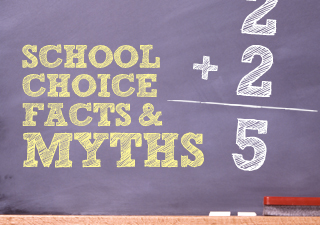Media
Facts vs. Silly Rhetoric on School Choice
 Tonight, I am speaking at a forum on school choice, and wanted to find some absurd, outlandish, and easily refuted claims from school choice opponents to lead with. Thanks to Sen. Daylin Leach, I don’t have to do much work.
Tonight, I am speaking at a forum on school choice, and wanted to find some absurd, outlandish, and easily refuted claims from school choice opponents to lead with. Thanks to Sen. Daylin Leach, I don’t have to do much work.
In a Capitolwire article, (subscription required) Sen. Leach takes already disproven myths and then adds a flair for hyperbole only he possesses:
“We already abandoned [the public school system] with the budget, now we are doing it again.” …
“To help a few kids, undoubtedly a few kids will be helped, … we are hurting the vast majority of kids.” …
“This is the first program I am aware of where you have to pray to a specific god to get into a government funding program.” …
Leach said between the state budget cuts and vouchers, “Class sizes could go up to 45 kids a class” and the impact of those cuts on poorer schools created learning environments that reminded him of “a third-world school.”
These distortions borrow heavily from the union talking points of 20 years ago. Of course, we now have the evidence from 26 school choice programs across the country (not including eight new programs enacted in 2011).
To his credit, Sen. Leach recognizes that students receiving vouchers would benefit. In nearly every study comparing voucher students to public school students seeking a voucher, but missing out in a lottery for limited number of scholarships, all or a sub-category of vouchers students learned more. In no case did voucher students do worse.
Voucher programs also improve graduation rates in places like Washington and Milwaukee, have higher parental satisfaction rates and reduce segregation. This is why parents in places with school choice want more of it.
But the evidence is equally clear that vouchers improve public schools. Again, nearly every study shows that implementing voucher programs increases public school performance in states or cities, and no study shows any harm from public schools. This evidence is mirrored by the success of school choice programs internationally.
Why? Partly because school choice forces schools to compete for students. School choice also reduces public school overcrowding, lowering class size. What should be self-evident, but apparently is not, is that as students leave, classes get smaller, not larger. Finally, school choice saves money, allowing public schools to increase spending per student or reduce school taxes,
Vouchers cost a fraction of what districts spend per student. Under the SB 1 scholarships for students in failing schools would average around $7,000—about half what these school districts spend per student (more than $14,000).
The claim that “you have to pray to a specific god” to receive a voucher is perhaps Sen. Leach’s most outlandish rhetorical claim. Under SB 1, funding would go directly to parents to use at their school of choice—no one is forced to join any religion, nor denied the ability to pray if they choose. As folks following this issue should know, the U.S. Supreme Court upheld the constitutionality of vouchers in 2002, and state courts have largely interpreted the Pennsylvania Constitution’s provisions about religious schools similarly. That is to say, school choice passes constitutional muster.
Finally, the attack that vouchers will turn failing schools in “third-world” schools bears mentioning. I’ve already mentioned that vouchers improve public schools, but I must add that the lowest-performing schools are failing to keep students up with the rest of the world. On an international comparison, Philadelphia students perform worse in math than 80 percent of the industrialized world. Pittsburgh students, worse than 71 percent; the same for Allentown. Students in York city and Harrisburg perform even worse. (And for readers who think your local schools are among the best in the world, I’d suggest you check the data).
Not only are kids in these schools failing to learn, but they are forced to endure thousands of acts of violence on school grounds every year. The facts about failing schools are a lot scarier than the disingenuous rhetoric about vouchers.